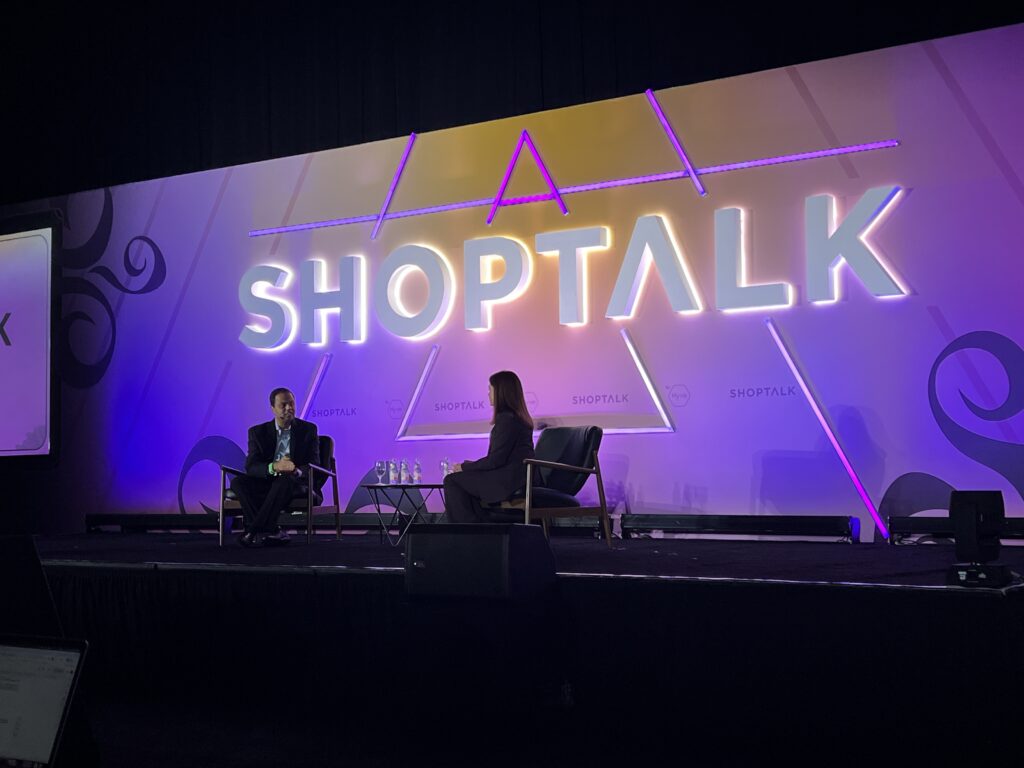Target is overhauling its website technology to adapt to the changing way consumers are searching for items, Ranjeet Bhosale, Target’s Vice President of Digital Product Management, told attendees at the Shoptalk Fall conference this September in Chicago.
The majority of Target.com shoppers use traditional keywords to search for products, such as “doll” or “puzzle.” But, a growing number of shoppers are typing in longer queries and questions into the search box, such as “What should I get for a 9-year-old girl’s birthday?”
That means Target’s search capability has to understand the correct products to show for this age and gender. Plus, the technology needs to understand the question’s context to showcase other products the shopper is interested in, such as party decorations, grilled meats and sunscreen, Bhosale said.
The reason for this shift: more consumers are using AI search platforms in general and are interacting with them in a more conversational way. As consumers write longer queries in large language models, they adopt that way of searching elsewhere, including at retailers.
Building a Foundational, yet Flexible Search Box
Target has been re-architecting its search platform since January 2024. The goal is to create a foundational yet flexible technology to ensure the search box still provides the critical functions but also is adaptable to changing shopper needs and can keep up with the fast pace with which generative AI is evolving. Shopper behavior changes constantly, so every 90 days Target needs to iterate on the consumer experience, Bhosale said.
“There are certain core foundational aspects that we know are going to be sustainable for the long-term that we are saying we need to double down and invest, and make sure that we are ready for whatever is thrown at us,” he said. “Case in point, being ready for GEO, making sure that our core product data is right and is available for any kind of agents to scale.”
GEO stands for Generative Engine Optimization, similar to search engine optimization or SEO, in which marketers ensure generative AI engines can easily understand and index their content.
Target’s goal is to get shoppers to the product they want quickly and eliminate any pain points along the way. Bhosale knows that sometimes shoppers will type something into search, scan through the results and not find what they are looking for, and then return to the search box with new keywords. This is the scenario Bhosale wants to eliminate.
“The best metric is when search becomes invisible, the guest automatically finds what they’re looking for and they feel confident that the choice they’re making is the right one,” Bhosale said.
Search Results That Understand Context
Of course, Target will be measuring the effectiveness of the new platform through traditional key performance metrics such as click through rate and conversion.
“They are not just looking for faster results, they’re looking for results that they can trust,” he adds.
Part of that trust is ensuring Target can deliver on the context of the search query, such as if the shopper is searching on her phone while physically in the store or while at home. For example, if a shopper is in the beauty aisle in a store while also browsing in the app, Target wants to only surface products that are in stock at the store she is in. Target is working toward that goal.
Target Preps for Agent-to-Agent Commerce
While most consumers still use traditional keyword search, Target knows that consumer behavior is switching from seeing it firsthand. For the 2024 holiday season it tested a generative AI chatbot that helped shoppers find gifts on its site. It had “great adoption,” Bhosale said, and it is now testing how to incorporate other gift finding chatbots for holidays such as Mother’s Day or Valentine’s Day.
Additionally, Target is preparing its technology for a world when consumers are shopping Target.com without even visiting the website. Instead, they are chatting with an AI agent, ChatGPT for example, about what they should buy as a gift for a 9-year-old birthday. The shopper’s AI agent is then chatting with an AI agent from Target about the right products to suggest.
“The future of SEO is becoming GEO,” Bhosale said. “We have to make sure that we’re training the agents, so that way they can understand and represent our products in an effective way to the guest that may be outside our platform with third-party agents.”







